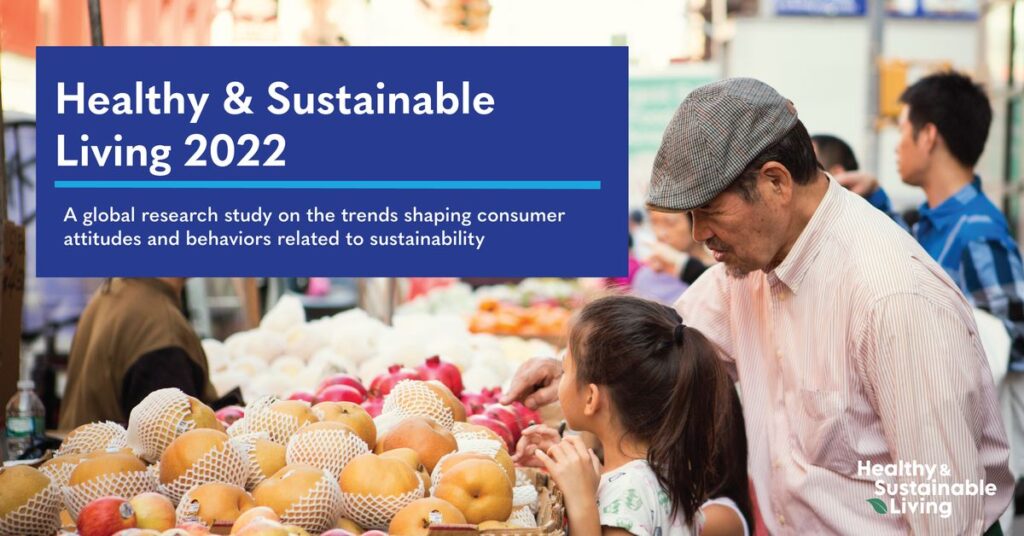Consumers realise that the planet is in trouble, and they want to do something about it. To help guide them, consumers welcome information about the environmental friendliness of the products they buy but many say they have not been reached by any communications on product sustainability. Many consumers are also discouraged by what they say are higher prices of sustainable choices, especially at a time of rising costs of living.
Highlighting the strong desire that many consumers have to change their consumption to save the planet, two in three people now say they are willing to reduce their consumption by half to avoid environmental damage and climate change, according to a new global consumer survey. The findings are from the 2022 Healthy & Sustainable Living research study by global insights and advisory consultancy GlobeScan, who surveyed almost 30,000 people across 31 markets. This study has been tracking consumer attitudes and behaviours around living healthier and more sustainable lifestyles since 2019 (with tracking of climate concern going back over two decades).

Results from the survey reveal that such strong concerns about the climate and the environment have led to a widespread desire among consumers to change their behaviours to be more sustainable, but the gap between desire and action remains persistent. Although half say they would like to change their lifestyle “a great deal” to be more environmentally friendly, only 26 percent claim to have made “major changes” in the past year to reduce their impact.
Consumers with low purchasing power, those who are younger, and consumers in emerging markets experience the largest gaps between aspirations and action – highlighting an urgent need to make sustainable living more affordable and accessible to all.
Soaring inflation is further aggravating the issue of affordability as a key barrier that makes more sustainable living feel out of reach for many consumers. Results of the study show that the cost-of-living crisis is affecting many consumers’ stated willingness to pay for more purposeful products and brands. Amid widespread increases in daily expenses, consumers have become less likely to say they are willing to pay more for products or brands that contribute positively to society or the environment, especially in Europe.
As many as three in four people around the world also believe that environmentally responsible products have become more expensive in the past year, and most agree that sustainable versions of products in a range of categories are more expensive than regular versions of the same products. In this context, it is becoming especially important for brands to ensure that sustainable options are offered to consumers at lower price-points.
While doubling down on the affordability of sustainable choices, brands should also make sure that they communicate the environmental benefits of their more sustainable product offerings to consumers. Despite recent discussions about greenwashing, the study also reveals that consumers are very receptive to sustainability marketing communications. Most of those who have heard or read about a company’s sustainability messaging say that they trust these communications, and most claim to use such information to make their purchasing choices.
However, results show that overall reach of sustainability communications remains limited. Only half of consumers say they have seen, read, or heard at least “some” information on environmental friendliness of a range of product types. Older consumers are especially less likely to say they have been reached by information about products’ environmental friendliness. This underlines the urgent need for brands to ramp up communications to enable more sustainable choices – not retreat for fear of accusations of greenwashing.
This is the time for brands to step up and enable consumers to live more sustainably. By making sure that more consumers are able to access more environmentally friendly options – especially in the context of a cost-of-living crisis – and by providing them with the information they need to identify more sustainable choices, brands can go a long way in helping consumers do their part. The strategy of the Collaboration for Healthier Lives Coalition of Action at The Consumer Goods Forum is evolving to embed sustainability and the coalition is very aware of the challenges of access & affordability for consumers and employees.
The 2022 study was designed by GlobeScan with a range of partners including Akatu Institute, IKEA, Levi Strauss & Co., M&C Saatchi Group, NYU Stern Center for Sustainable Business, P&G, PepsiCo, Reckitt, Visa, and WWF International. The goal of the study is to help organisations better understand the mindsets of consumers globally and what enables or prevents them from living in a healthier and more sustainable way.
